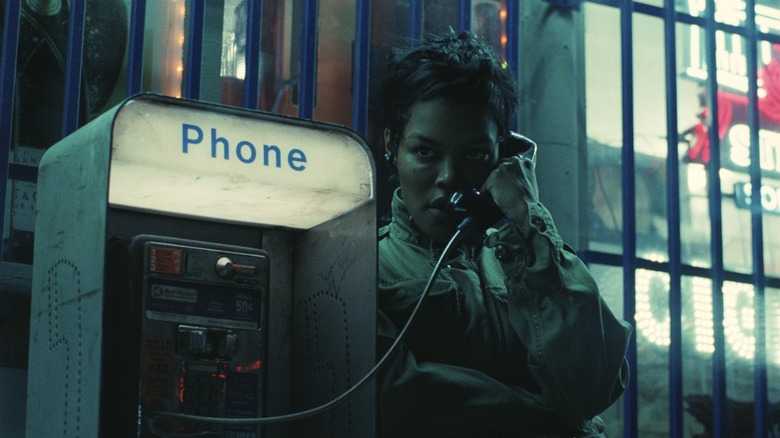In the inaugural edition of “Cinema with Professors,” The Guardian sat down with Sharon Rose and Farrell Ackerman, professors in UCSD’s linguistics department, to discuss the new Denis Villeneuve-directed film “Arrival,” which follows a linguist tasked with decoding the language of an alien species that arrives on Earth.
Guardian: What do you think about the main character’s approach to decoding the alien language, and what would you have done differently?
Sharon Rose: We should talk about what linguists do first, because one of the ways the movie didn’t quite get it right was in the way that they talked about what linguists actually do. For example, when the general — Forest Whitaker’s character — came to her and said something about thanking her for the Farsi translations she had done, that was a little odd because linguists generally don’t do translations, and the government would’ve had a Farsi translator anyway. The linguist in me was annoyed because we don’t just translate.
Farrell Ackerman: There was also that initial scene where Forest Whitaker puts down a tape …
SR: Oh right, and just plays noise.
FA: He plays noise for about four and a half seconds, and he says, “What does that mean?” Now that’s got to be the dumbest question.
SR: And actually, they did get that right; she handled that very well. First of all, we don’t even know if it’s a language or a communication system. It could just be noise, so how can you tell? So she said, “Well I would have to interact with them.” So that, they did get right. She basically approached it like a field linguist — somebody who is looking at a language or some kind of communication system, knows nothing about it and has to figure out how to start. And that’s how we teach our students how to do it in our classes. We have a speaker of a language who comes to the class, the students know nothing, and their job is to figure it out.
G: And how would you approach non-objects and non-action verbs? The question they were trying to figure out how to communicate was, “What is your purpose on Earth?” So how would you, for example, try to communicate “purpose”?
SR: I thought that the movie also handled this quite well. You can’t start with this sentence; you’ve got to figure all the component pieces. We don’t even know if they have a concept of purpose. We’ve got to get to that by building up slowly. Getting to conceptual aspects like purpose would have required an enormous amount of work, months and months of building up this structure until you could actually get to it, assuming they even had this concept. They might not have had a word for it; they might have had several words that, combined together, might give a sense of purpose. And notice that they had trouble with the word “weapon.” That kind of polysemy — one word having multiple meanings — was also quite well done.
The other thing they did well was to look for patterns in the data they were getting, so that’s exactly what linguists do. We collect data, we look at the patterns, and we try to figure out how the system works. So attacking it like a system — looking for things that are recurring, and those recurrences have a particular meaning — that’s what they did when they approached the symbols.
G: There is kind of this feud between science and linguistics in the movie. When the linguist and physicist first meet, they have that question of “What is the foundation of life? Is it language or is it science?” What do you think?
SR: Well, I don’t know if it’s the foundation of life; it’s certainly a component piece and a large portion of what it means to be human. But we do approach language in a much more methodical, mathematical way than many people think we do. So linguistics is not just about learning languages or translating languages.
FA: There’s also something really implausible in the movie that feeds into naive stereotypes about what linguists are. So she starts out giving a lecture on romance languages, and then it turns out she’s done translations of Farsi. And then, he barges into a room that she’s in later on and says, “The general in China is speaking. Could you tell me what he’s saying?” This is such a silly notion of what the skillsets of linguists are. In addition, she had the computational capacities to be able to go through all of the mini differences in all of those circles in order to figure out what the pattern was. So it gives you a very strange notion of what a linguist — a single linguist — can do.
SR: That’s right. They portrayed her more as a polyglot.
FA: And then they turned her into something else that she had to be in order to crack the code. The idea that you could take an alien language with an utterly different kind of mind and be able to crack it in a couple of months is extremely naive.
SR: One of the interesting aspects was that the noises and the sounds that the aliens were making actually turned out to be completely unrelated to the code. So that, I found really fascinating because that’s the reverse of how human language functions. Human language is all about sound and its oral use — or for sign language, its visual use — and what you write down is your attempt at just transcribing that. And it’s a poor attempt. Every writing system fails in some way to encode something. So when we write down English, and English spelling is really terrible, it doesn’t encode all sorts of interesting properties of English that we need to know.
G: Like inflection?
SR: Yeah, all the minute phonetic pronunciations that you have to know how to do if you’re an English speaker or if you’re learning how to produce English properly is not encoded in our writing system. So it’s an imperfect way of coding the richness of language. And so, what was interesting about that was that the symbols they were using were the richness. It was the communication system. The sounds they were producing were immaterial. But that went by way too fast, and I thought, this is incredibly important and interesting, yet they didn’t give focus to it at all.
G: They said their language communicated meaning rather than sound. Are there any languages that have anything even relatively close to that?
SR: No, because human language has to be either spoken or signed. That’s the essence of language. You can write it down, but the writing is secondary. Even the dead languages, like Sanskrit and Latin, were were spoken languages at one point, but the writing system is all that remains. We can glean from descriptions of how people said they were supposed to be pronounced, but we don’t have any audio to actually know how people produced it.
G: Are there any examples in history that felt reminiscent of what was portrayed in the movie?
SR: No, because this was not one human talking to another human. It wasn’t as if somebody was opening their mouth and making a sound; they couldn’t even figure out what the language component was that they were supposed to be paying attention to. At first, they thought it was sound, and then, they had to figure out what was this ink stuff that was emitting from their tentacles.
FA: On some level, it was funny that she began with the assumption that there was such a thing as a statement and a question in the alien’s language. That’s a big presumption; you can imagine a creature that is omniscient, for which there are no questions, there are no hidden purposes, and there’s nothing to question.
I had a friend I went to graduate school with who for a part of his life after graduate school was employed to go into the highlands of New Guinea and contact previously uncontacted tribes that were cannibalistic.
SR: Well, uncontacted by?
FA: Uncontacted by whites, right. Well, even with other people who were not white, it’s not clear how long that contact lasted (laughs). In some sense, that’s what was happening in the movie.
SR: There was one interesting comment in the movie where she starts by saying the English word for human and writing it down. Then he said something like, “You’re trying to teach them to read and speak at the same time,” but that’s not actually what she was doing. She was trying to figure out which method worked. If I give both of these at the same time, they’re going to gather a response to something. And she wasn’t actually trying to teach them English. It was just to teach them the ways in which we communicate: I use this sound, I write this word. So she was trying to get them to do that by using her own communication system. And the whole thing should’ve taken years.
FA: As we know from having worked on the same language for many, many years.
G: It’s also kind of strange in the movie that despite each pod landing in a different country encountering a different language, all of the countries started to figure out the alien’s language at around the same time. Do you think any nation would have an advantage in cracking the alien’s language?
SR: Maybe China, because the alien language was a symbolic system. It had concepts tied up altogether in a single symbol, and the writing system that Chinese languages use is more like that. And so they might have an advantage.
G: So Americans wouldn’t be exceptional in this case?
SR: No, not at all.
FA: I think with good computational power, every nation would be in the same boat.
SR: Yeah, China may have had an initial advantage if they assumed the symbol system was like their symbol system. But once you figured that out, it’s all fair game.
G: You mentioned before we started this theory that the language you speak shapes your brain and your mental processes.
SR: It’s supposed to be that it reflects your worldview, so the language is basically a filter on how you see the world around you. It restricts and opens certain concepts that you might not have if you spoke a different language.
FA: So folks who speak different languages occupy different worlds by virtue of their language.
G: What is the status of this theory? Is it accepted as truth at this point?
SR: So it’s referred to as the Sapir-Whorf hypothesis — named after two linguists, Edward Sapir and Benjamin Whorf.
FA: It’s also referred to as the linguistic relativity hypothesis.
SR: It really comes and goes. It’s a very fluctuating theory that never goes away, so it has highs and lows in term of popularity and the number of people working on it. There’s sort of a strong version and a weaker version. The strong version basically says that language determines your worldview. The weaker version is that it influences your worldview, so it’s not like it’s the complete and only determiner, but it has some impact. So I think people might be more willing to accept the latter one.
Lera Boroditsky in the cognitive science department here is somebody who’s pursued the idea from a more scientific viewpoint. She has much more systematic, psychologically-based experimentation to test notions of the linguistic relativity hypothesis, which people didn’t really do as much before. So I think it has much more scientific rigor when it’s looked at through that lens.
G: Overall, would you say that “Arrival” portrayed linguists well, moderately well, poorly etc.?
SR: I would say moderately well. You know, it was nice to have a linguist as a protagonist where the linguist was actually doing something related to the profession. We’ve had other examples of linguists in movies recently. For example, in “Still Alice,” Julianne Moore plays a linguistics professor and there is a moment where she gives a lecture about language acquisition, which was quite well done. But that was sort of immaterial to the whole concept of the movie. It just happened to be her profession.
But this is actually the linguist as the main character and doing her job as the main issue in the movie, so that’s really great.
FA: I always find myself — well, what can one expect — disappointed. I find language endlessly mysterious, and I would hope that when an audience sees a movie like this, they’re just as mystified at the magnificence of language that I feel. And I feel like it’s a deprivation, actually, that there were so many opportunities to enrich people’s understanding about what language is and it wouldn’t have taken a lot. That’s why I was interested when you told me that there was an actual linguist consultant because it wasn’t obvious to me.
SR: Apparently, she had some trouble getting them to change certain things and she complained about the language translation aspect. There were certain things she managed to get right and there were other things that they didn’t respond to.
FA: I would imagine that everybody who knows something about something must feel that sense of disappointment when you see a movie about it. What do physicists think about “2001: A Space Odyssey?”
SR: I went to see it with a friend who’s a lawyer and she said she can’t see legal movies because it just drives her crazy how many things they get wrong. So we had that attitude of, at least they were doing something that is useful. And she does make a breakthrough, so the linguist is the hero, which was quite marvelous. But there were some things that weren’t portrayed accurately, so we still are left with a misperception about what linguists do.
FA: I guess on the most generous interpretation, it is quite clear that language is enormously important. I don’t think you can come away from this movie, however you interpret it, and think that somehow language isn’t central to what it means to be human and for making a difference in the way that the world works.
SR: And also, there’s one really interesting thing that was not really addressed, which is, was what they were producing language, or was it a communication system? There’s always this debate about whether non-humans are communicating through language, so do we have dolphin language, do monkeys have language, and can they learn language? And linguists will say that human language has this particular structure to it, which is not seen in animal communication, so they’re not really the same thing. But that doesn’t mean that animals aren’t communicating; they’re just using a different system. So in this movie, were the aliens using a language or were they using a communication system? And they treated it like a language, right?
FA: Yeah, and I think the only way for the Sapir-Whorf hypothesis to go through is if it really is a language, because that’s what really created the differences in the world. Language is a systematic way of categorizing the world, whereas there’s no evidence of the same in communication systems.
BONUS QUESTION: MAJOR SPOILERS AHEAD
G: How grounded in reality do you think that part of the movie was, in terms of learning the alien language allowing her to access the dimension of time?
FA: It’s as close as we presently are to a time machine; in other words, not at all. When we’re seeing these flashbacks and flashforwards sporadically, and that was reflecting her gradual acquisition of the language…
SR: But I thought that wasn’t clear at all in the movie. Like you said, the Sapir-Whorf hypothesis was mentioned very briefly, and then she started having these flashback moments, but it wasn’t at all clear that it was connected to her acquisition of the language.
FA: No, I think it’s only in retrospect that I’m thinking that. So confusing.
SR: During the movie, it seemed as if it was when she was able to create the symbols herself, it was almost like it was accessing her brain in some way. It was accessing something about her mind, because it was associated with her seeming to have dreams about it, and it was associated with her when she communicated to them that they were somehow tapping into something in her brain. That’s the way I interpreted it. And it wasn’t clear that it was because she learned the language. It was almost as if they were making a connection with her. So this is why the Sapir-Whorf thing wasn’t a big point.
FA: I didn’t even think about that. I thought that she was gradually understanding the effect that the acquisition of the language was having on her, and this eventuated in her book. Because once she got command of it, she then understood her perception could no longer be the same. So this was a gradual transformation, which, to the viewer, we didn’t understand anything more that was happening to her than she did. Only at the end, when she’s unpacking the book, you see what that is, and all the pieces start coming together. With respect to reality, who knows? I’ve never taken ayahuasca, but there are all sorts of dimensions that liberate our minds. Maybe if you read enough poetry, which I guess is a language, you wind up doing these sort of time travel things as well. Who knows?
SR: The structure of the language, though — this idea that the symbol is supposed to be this continuous, nonlinear aspect and the concepts that were encoded in the symbol — it wasn’t clear to me. Were those supposed to be sentences?
FA: Yeah, I didn’t get that either.
SR: A sentence has particular concepts and you convey information. How was it that they were managing to interpret those sentences accurately without some knowledge of how the words related to each other? That was never conveyed in the movie at all. And as a linguist, I’m sitting here thinking, how is this working? How do they know what the subject is and what the object is? Maybe those are two linear concepts that I’m not supposed to enter into, but they never explained that at all.















ATAN'EKO • Jan 10, 2017 at 12:12 pm
kaltxi, oel ngati kamaeie …
Chuck Mire • Nov 26, 2016 at 11:00 pm
Would it be appropriate to consider that an alien language might be:
like birdsong (Green Mansions by W. H. Hudson);
like music (Close Encounters of the Third Kind);
at an audio ULF or UHF frequency beyond human hearing;
with colors in a part of the visual spectrum beyond human sight;
strictly oral with some poetic meter as a mnemonic to aid memory (Orality and Literacy by Walter Ong)
Ylla • Nov 26, 2016 at 7:58 pm
Really enjoyed reading this. Would love to see a series with scientists from relevant fields debating movies. Also, Cinema with Scientists is a great tag name.
Jason • Nov 17, 2016 at 2:25 am
I have read a lot of reports about alien encounters and the majority of them mention being communicated to via a form of telepathy, like the information is just downloaded into the persons head. It’s an interesting discussion that has to be made for the future (if you believe we will be contacted officially).